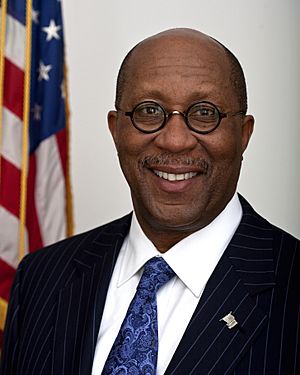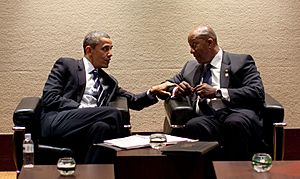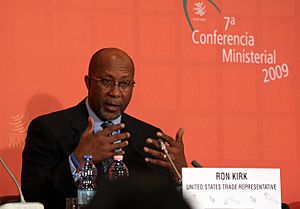Ron Kirk facts for kids
Quick facts for kids
Ron Kirk
|
|
|---|---|

Official portrait, 2009
|
|
| 16th United States Trade Representative | |
| In office March 18, 2009 – March 15, 2013 |
|
| President | Barack Obama |
| Deputy | Demetrios Marantis |
| Preceded by | Susan Schwab |
| Succeeded by | Michael Froman |
| 56th Mayor of Dallas | |
| In office June 5, 1995 – February 20, 2002 |
|
| Preceded by | Steve Bartlett |
| Succeeded by | Laura Miller |
| 97th Secretary of State of Texas | |
| In office April 4, 1994 – January 17, 1995 |
|
| Governor | Ann Richards |
| Preceded by | John Hannah |
| Succeeded by | Tony Garza |
| Personal details | |
| Born |
Ronald Kirk
June 27, 1954 Austin, Texas, U.S. |
| Political party | Democratic |
| Spouse | Matrice Ellis |
| Children | 2 daughters |
| Education | Austin College (BA) University of Texas at Austin (JD) |
Ronald Kirk (born June 27, 1954) is an American lawyer and politician. He held important roles in government. He was the United States Trade Representative from 2009 to 2013. Before that, he served as the 97th Secretary of State of Texas. He was also the 56th mayor of Dallas from 1995 to 2002. Ron Kirk is a member of the Democratic Party.
Born in Austin, Texas, Kirk went to Austin's John H. Reagan High School. He then studied at Austin College and the University of Texas School of Law. He made history as the first African-American to be both the Secretary of State of Texas and the Mayor of Dallas. After his time as mayor, he worked as a lawyer and a lobbyist.
President Barack Obama chose Ron Kirk to be the U.S. Trade Representative. The U.S. Senate approved his nomination on March 18, 2009. He stepped down from this role on January 22, 2013.
Contents
Early Life and Education
Ron Kirk was born in Austin, Texas, on June 27, 1954. He was the youngest of four children. His father worked for the U.S. postal service. Ron grew up in a mostly African-American neighborhood. He went to public schools in Austin. In high school, he was a leader. He was elected student council president in his senior year at John H. Reagan High School.
After high school, Kirk attended Austin College. He graduated in 1976 with degrees in political science and sociology. He then went to the University of Texas School of Law. He earned his law degree in 1979. He practiced law for a few years. In 1981, he worked for Texas Senator Lloyd Bentsen. Later, he returned to Texas. He worked as an attorney for the city of Dallas. He also worked for a law firm. Ron Kirk is the nephew of civil rights leader William Astor Kirk.
Texas Political Career
In 1994, Ron Kirk worked for then-Texas Governor Ann Richards. He served as the Secretary of State of Texas. The next year, Kirk decided to run for mayor of Dallas. He had strong support from Dallas' business community. He also had support from important members of the city's African American community.
Kirk won the election and became the first African American mayor of Dallas, Texas. He won with 62 percent of the votes in 1995.
Mayor of Dallas: Key Projects
As mayor, Kirk was known for bringing people together. He helped the Dallas City Council and School Board work well. He introduced the "Dallas Plan." This was a big plan for the city's future over 25 years. It included the Trinity River Project. This project aimed to build parks and roads along the Trinity River. He also supported building the American Airlines Center. This large sports arena opened in 2002.
In 1999, Kirk was re-elected as mayor. He won by a large margin, getting 74 percent of the votes. During his campaign, an advertisement used music from Star Trek. It called Kirk the "captain of the Dallas Enterprise." This ad was later removed after a request from the show's owners.
In 2002, Kirk left his role as mayor of Dallas. He decided to run for a U.S. Senate seat. He ran against Texas Attorney General John Cornyn. Kirk lost the election, getting 43 percent of the votes.
After Being Mayor
After his Senate campaign, Kirk returned to working as a lawyer. He was briefly considered for a leadership role in the Democratic National Committee. He later became a partner at a law firm called Vinson and Elkins. He also worked as a lobbyist for some large companies. A lobbyist is someone who tries to influence government decisions on behalf of a group or company.
U.S. Trade Representative
Many people thought Ron Kirk might become the U.S. Secretary of Transportation. However, President Barack Obama chose him for the role of U.S. Trade Representative instead.
Becoming the Trade Representative
Some people criticized his selection. This was because he supported the North American Free Trade Agreement (NAFTA). NAFTA is a trade deal that some people did not agree with. There was also a small issue about some past tax payments. Ron Kirk had made payments to a scholarship fund. He also claimed some deductions for basketball tickets. These issues were resolved.
The U.S. Senate approved Kirk as United States Trade Representative. This happened on March 18, 2009. The vote was 92 in favor and five against. He was sworn in on the same day. Vice President Joe Biden formally swore him in on March 20, 2009. Ron Kirk was the first African American to hold this important position.
Work as U.S. Trade Representative
As the U.S. Trade Representative, Ron Kirk was given the title of Ambassador. He was also a member of the President's Cabinet. His main job was to handle trade deals for the United States. He worked on issues related to intellectual property rights. Intellectual property includes things like inventions, books, and music. He worked to make sure these rights were protected in the U.S. and other countries. This work involved treaties like the Anti-Counterfeiting Trade Agreement (ACTA) and the Trans-Pacific Partnership (TPP).
Trade Relations with China
Kirk often talked about concerns from American businesses. They worried that China was not properly protecting the intellectual property rights of U.S. companies. Some believed the Chinese government shared company secrets with local businesses. This would help local companies compete better. Kirk also criticized China's internet censorship. He considered challenging these rules in the WTO (World Trade Organization). This would have been a first-of-its-kind case.
ACTA in South Korea

Ron Kirk played a role in convincing South Korea to adopt an early version of the Anti-Counterfeiting Trade Agreement (ACTA). This agreement aimed to fight against fake goods and copyright infringement. After South Korea adopted it, many websites were taken down due to copyright issues.
Trans-Pacific Partnership Discussions
In 2012, some legal experts criticized the way the Trans-Pacific Partnership (TPP) treaty was being negotiated. They said the process was "biased and closed." They asked Kirk to make the negotiations more open. They wanted the public to see the negotiating texts. These experts felt that the proposed rules would mostly benefit companies. They worried it would not help consumers or libraries enough.
Kirk responded that the process was very transparent. He said it was more open than previous trade agreements. However, the academic group argued that trade agreements are usually secret. They said this was not a good standard for the TPP. They believed the TPP was not just about trade. It was about setting new international rules for domestic laws.
Kirk later defended the secrecy. He said some privacy was needed to keep negotiating strength. It also encouraged other countries to share their ideas. He mentioned that when drafts of another trade agreement were released, a final deal was never reached.
On January 22, 2013, Ron Kirk announced he was stepping down. He left his role as the U.S. Trade Representative.
See also
- History of African Americans in Dallas-Fort Worth
- List of African-American United States Senate candidates
 | Delilah Pierce |
 | Gordon Parks |
 | Augusta Savage |
 | Charles Ethan Porter |


